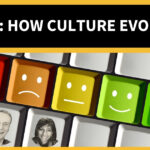Here at the Daily Evolver we’ve been tracking the rise of science and secular humanism (and even transhumanism) in popular culture with interest. Atheism has become respectable , even fashionable as the modern, rational stage of development becomes the true center of gravity in the Western world. Traditional religious people and their beliefs have become targets for the secular humanists. Exhibit A is this collection of ten video clips on Salon, “From Colbert and Oliver to Sarah Silverman and Louis CK, comedians are torching anti-science activists with aplomb.”
Which brings me to the recent article in HuffPost Politics by Zoltan Istvan, philosopher and author of the novel The Transhumanist Wager. Istvan makes a case for outlawing the religious indoctrination of children. Installing these beliefs at an early age may handicap their ability to rationally choose a religious path (or not choose one) for themselves later in life, he says.
From a modernist perspective its not hard to see how this would make sense. To them, religion is a collection of myths, and “we go to war to defend these myths,” he writes. Perhaps if we stop instilling this stuff at an early age it will die out, right? After all, what rational person would choose to believe such things? (Indeed. Traditional religious beliefs are pre-rational, which is why you will never win an argument with a fundamentalist based on logic).
But Istvan is lacking a developmental perspective.
He writes that religion would be okay if it didn’t meaningfully interfere with the world…
“The problem is that it does meaningfully interfere with the world. 911 was a religious-inspired event. So was the evil of the Catholic Inquisition. And so is the quintessential conflict between Palestine and Israel. If you take “God” and “religion” out of all these happenings, you would likely find that they would not have happened at all. Instead, what you’d probably find is peaceful people and communities dedicated to preserving and improving life through reason, science, and technology–which is the essence of transhumanism and the outcome of evolution.”
He is looking at the world through the lens of his modern (rational) sensibility and seems sure that if people just thought like him, we would be living in a peaceful utopia. This is one of the defining aspects of first tier structures of consciousness — they are exclusionary, and they each believe that they have the answer to humankind’s salvation. For traditionalists, we all need to be saved by God. For modernists, we all just need to become rational.
Istvan has more in common with first tier religious fundamentalists than he would ever like to believe. Technologist and philosopher Lincoln Cannon picked up on this irony in a post on his blog:
“…for many Transhumanists, Transhumanism is functioning as a religion. No. I’m not saying that Transhumanism is inherently a religion. In itself, the advocacy of ethical use of technology to extend human abilities need not be religious. However, it nonetheless ends up functioning as religion for many persons that adopt and identify with the ideology.”
 Istvan is not wrong about the violence and intolerance of traditional religious groups. But taking religion out of the equation would not make them peaceful. Religion is not the cause of intolerance. Religious intolerance is the effect of an absolutistic structure of consciousness that organizes the world in terms of good and evil; A fundamentalist belief system is a reflection of this consciousness, not the other way around. (And, we should note, it represents a huge leap up from the impulsive, egocentric tribal stage that came before). We all make God in our own image — or unmake him, as is the case in modernity.
Istvan is not wrong about the violence and intolerance of traditional religious groups. But taking religion out of the equation would not make them peaceful. Religion is not the cause of intolerance. Religious intolerance is the effect of an absolutistic structure of consciousness that organizes the world in terms of good and evil; A fundamentalist belief system is a reflection of this consciousness, not the other way around. (And, we should note, it represents a huge leap up from the impulsive, egocentric tribal stage that came before). We all make God in our own image — or unmake him, as is the case in modernity.
Without this perspective we are also likely to make the mistake of conflating postmodern and premodern religious belief (the classic pre/trans fallacy). To a modernist, any mention of God brings to mind premodern structures because he can’t yet identify postmodern structures.
I like Istvan’s article though. He’s a smart guy and I’ll take his transhumanist-atheistic proselytizing over that of a religious fundamentalist any day.






Before jumping into Trans-humanism on this subject I think we should first make a pit-stop at New-Atheism. Sam Harris seems to be the writer at the cutting edge of this growing movement and he’s moving in two directions at once. Simultaneously attacking the religious foundation of middle east violence as he has done here:
http://www.samharris.org/blog/item/why-dont-i-criticize-israel
…while embracing almost an integral perspective on spirituality as he has done here:
http://www.samharris.org/blog/item/chapter-one
FYI: Many in the integral community were first introduced to Sam’s work from the interview with him Stuart Davis did for Integral Naked. http://in.integralinstitute.org/contributor-125.aspx
Paul, I think you’re right — Jeff and I were just talking about Sam Harris’s new book, “Waking Up”, and a longer version of this article would have included mention of the “New Atheists”, Dawkins, Harris, Hitchens…
I think Harris is a great atheist thinker but does not have an integral perspective as far as I can tell.
Swami Beyondnanda has it right. The fundamentalist needs to put the fun before the mental. Then we might be able to reason with them!
David — I love that!
Good article, but what are these “postmodern structures” you’re talking about?
Gear Mentation, Thanks. You can read more about structures of consciousness on the Theory page, here http://www.dailyevolver.com/a-primer-on-integral-theory/
Hello Brett,
I like that you put a post up on this topic. Religion and violence have been in the news and I’ve found it interesting to see various premodern / modern / post modern perspectives. As with everything, without an understanding of the quadrants and general development the conversation is quite disjointed.
After reading Istvan’s post, I find it surprising just how purely rational he is. Some of his words almost seem as if they are a direct quote from the description of orange in Spiral Dynamics. I get the impression he is a little shocked that people would believe such apparently silly and irrational things, without realizing that he himself went through the same phase of blind authority based belief.
You mentioned the New Athiests, and I’m interested in your further thoughts on them. How you see them fitting into the bigger picture? Paul mentioned Sam Harris, whose writings I have been reading recently too. He has been in the news a bit recently on this topic of violence and (Islamic) religion. Unfortunately I haven’t found many people to have an integral conversation about this. The whole integral thing can be a bit lonely at times.
Here is my view:
I agree with your key distinction that premodern structures are not worldcentric, and therefore are ok with violently harming others outside their own group. A modern structure won’t do this and isn’t compatible with those beliefs. This is true regardless of the surface structures. The New Atheists seem unaware of this. The postmodernists like Reza Aslan agree that religion isn’t determinative by pointing out that many Muslims are nice people (modern / post modern), and are eager to defend them against any blanket statements about them as a group.
So I agree with you that religion is not THE cause of violence, but as as a mismatcher, I think it is still A cause of violence.
Afterall, all 4 quadrants are interdependent and closely connected to each other, what happens in one quadrant affects the others. So if there are blockages in the bottom left and bottom right quadrants of a religion, it will affect the center of gravity of the average follower.
For example, surface structures do vary. Jainism is very committed to non violence, where as the Bible and Qur’an have thousand year old verses which can be interpreted as commanding violence. So while black and white thinking is necessary for extremist violence, it also matters what actual beliefs are being run through that black and white filter.
Also as I’m sure you know, Ken has talked about religion ideally functioning as a conveyor belt, you get on as a child and it takes you from magic to integral and beyond. At the moment, mainstream Christianity (and from my understanding Islam too) essentially stop at mythic. So there is a large chunk of exit-premodern people that are faced with the apparent choice of staying at mythic, or ditching the whole thing completely and going to rational. The perceived choices are; either the whole thing is true, miracles and all, or it’s all just an illusion with nothing of value, including salvation.
Additionally, I think that many people have had powerful state experiences, and the only validation they see of this experience is a mythic story. This discourages them from progressing to rational due to the apparent binary choice between “keep it all” or “throw it away” completely. They know the state experience was real and not something they can easily discard.
I see this different to Buddhism for example, because it’s relatively easy to begin to rationally dismiss prerational Buddhist ideas like Mara the tempting devil, while still understanding the journey to enlightenment. So you can reinterpret the religion, keep any state experiences and move to rational without completely leaving the religion.
With Christianity (and Islam I believe), few people see “heaven” as a state you can reach on earth, and “hell” and “sin” representing suffering and Dukkah in this world. I think this is a harder and more complex transition to make than in Buddhism.
So that that way, I would argue that religion can be a contributing factor to violence.
I think when the New Athiests talk about religion causing violence, they have some vague sense of this. Most don’t understand states, but as Paul mentioned Sam Harris does, and along with many others, he is working to help people inside Islam to reform it. Presumably to help more Muslims become more healthy at their current stage, and to create a path for them to move to rational while keeping the salvation offered by meditation and states.
Greg, thanks for your thoughtful comments! You definitely parsed out some of the interesting details behind this. Jeff and I agree with everything you wrote and he even quoted you on last night’s show. Have a listen when we post it!
Wow Brett, that’s really great to hear, I feel a connection with you guys!
The more I’ve thought about it over the past few days, the more I simultaneously think there are many interconnections / interdependencies / compensations which I am not aware of, and the more I also think there is wisdom and beauty in the system as it evolves.
For example –
As I’m sure you know, the situation in the Middle East is also affected by US foreign policy, which is also affected by US religion and levels of consciousness – eg “God bless the United States of America” – Bush.
Also, the wisdom of many traditionalists fighting for God in second person (eg. a personal relationship with Jesus / and possibly Allah), which unlike first or third person is often lacking in Buddhism and in spiritually outside of the monotheist traditions. This is something I didn’t think of in my previous post, very likely due to my own limited perspective and experiences with 2nd person God. But many traditionalists are fighting for it on my behalf, somehow this version of God gets pushed through the system like a child making spaghetti by experimenting with a bucket of multi colour playdough and a garlic press.
Looks like you just posted the new show too, so I’m excited about reading your intro and hearing to Jeff’s thoughts on the topic!